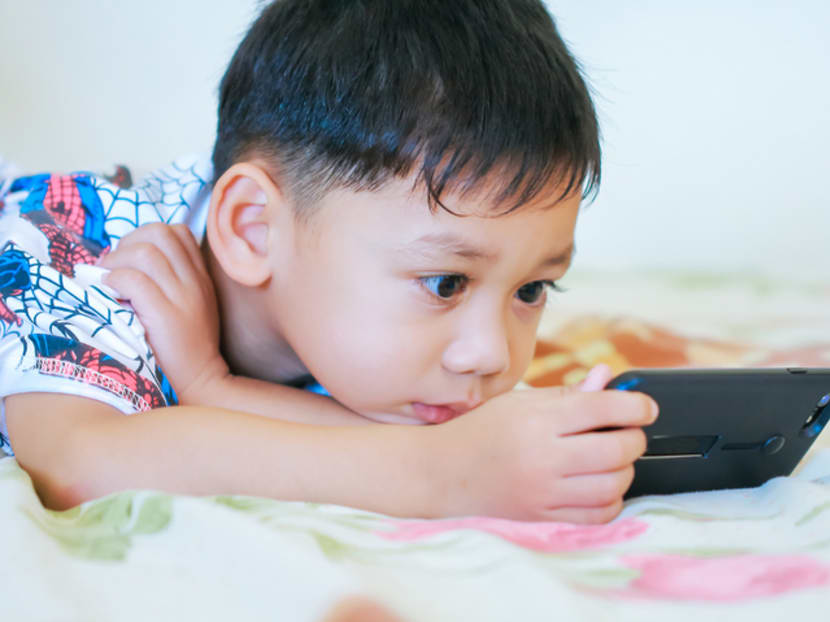Code of practice for app stores to protect children from harm in the works, online games may also be classified: Josephine Teo
SINGAPORE — A code of practice for online application stores aimed at protecting children from harmful content is in the works while a classification system for online games is also being considered, Parliament heard on Tuesday (Feb 28).

The planned code of practice for app stores aims to protect children from harmful content such as sexual and violent material.
- Aimed at protecting children from harmful content, a code of practice for online application stores is in the works
- Minister for Communications and Information Josephine Teo said app stores, may carry mobile applications with harmful content that depicts explicit sexual activities or incites violence
- While the code will take time to be developed, she said it will curtail the “risks of exposure to harmful content through games” on app stores when it is eventually introduced
SINGAPORE — A code of practice for online application stores aimed at protecting children from harmful content is in the works while a classification system for online games is also being considered, Parliament heard on Tuesday (Feb 28).
Such a classification system would operate along the same lines as the system now applying to video games.
Communications and Information Minister Josephine Teo said: “This will clarify the age appropriateness of games, and help parents exercise better supervision over their children’s online gaming.”
Speaking during a debate on her ministry’s budget, she said that the "code of practice for app stores" will be a step forward to strengthening online safety, because these stores may carry mobile applications with harmful content, especially for children.
“This will clarify the age appropriateness of games and help parents exercise better supervision over their children’s online gaming.Communications and Information Minister Josephine Teo on the possible classifying of online games”
This may include content depicting explicit sexual activities or inciting violence, she said.
“As with social media services, app stores should be expected to have systems and processes in place to deal with harmful content.”
The code will take time to be developed, but Mrs Teo said that it will curtail the “risks of exposure to harmful content through games” on app stores when it is eventually introduced.
She noted, though, that games may also be accessed in other ways other than app stores and the authorities are studying how to deal with this.
Giving a time-frame, Mrs Teo said that the Government will be working towards curbing harmful content for children over the next 12 to 18 months.
In a related move, the Government has begun a survey on online gaming, involving parents and children, with the aim of understanding whether more can be done to reduce cyber addiction.
This survey is necessary because there is no international consensus on the nature of the problem or the effectiveness of measures, Mrs Teo said.
Furthermore, the concerns in Singapore are not fully understood.
The survey will examine the exposure of children to unwanted interactions and inappropriate content on gaming platforms, as well as the social and psychological impacts of gaming.
DIGITAL ACCESS FOR LOW-INCOME FAMILIES AND THE ROAD MAP FOR S'PORE'S DIGITAL INFRASTRUCTURE
Aside from looking at ways to protect children from online harm, the debate on Ministry of Communication and Information's budget touched on how the ministry aims to improve Singapore’s digital infrastructure for homes and businesses.
Among them is the introduction of DigitalAccess@Home from April 3 this year, which will provide subsidised broadband and digital devices to eligible low-income Singaporean households.
Under this scheme, the monthly cost of broadband will range between S$5 and S$15, depending on the size of the home. For an extra S$5, households may also double their bandwidth speed from 500Mbps to 1Gbps.
Other details of the scheme include subsidising between 25 per cent and 75 per cent of a beneficiary’s cost of electronic devices.
This means that they could pay between S$75 and S$250 for a tablet, and between S$220 and S$710 for a laptop.
Communications and Information Minister Josephine Teo said that S$80 million has been set aside over the next four years to fund this scheme, which will be able to support 60,000 households.
She also spoke about the "digital connectivity blueprint", which will outline what is next for Singapore’s connectivity infrastructure.
This includes the broadband, mobile and Wi-Fi networks that power Singapore’s domestic connectivity, and subsea cables that provide international connectivity.
Dr Janil Puthucheary, Senior Minister of State for Communications and Information, will co-chair an advisory panel comprising business and industry leaders with Mr Irving Tan, the executive vice-president of global operations for computer company Western Digital.
The panel will ensure the blueprint meets Singapore’s needs, and this phase of work is expected to take six to nine months, Mrs Teo said.
Separately, the Ministry of Communication and Information said in a press release that a Digital Enterprise Blueprint will be launched later this year to digitalise the economy.
Among its initiatives is to provide a financial incentive to encourage businesses to adopt digital utilities such as InvoiceNow.
Other plans involve providing small- and medium-sized enterprises (SMEs) with support to protect themselves from cyber attacks.
This will be done through a scheme that will subsidise cybersecurity consultancy services and tailored cybersecurity health plans to help SMEs work towards national cybersecurity, the ministry said.











